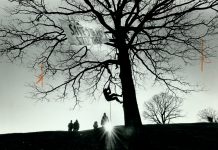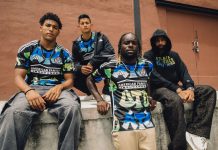
Photograph by Sean Keenan
Tyler Lyle, the Atlanta-based half of synthwave band The Midnight, believes the city “got punked by the gun lobby,” as Music Midtown organizers on Monday called off the iconic, (usually) annual festival at Piedmont Park.
Promoter Live Nation pulled the plug on the event after they were ensnared in a debate over whether guns should be permitted at the event, local journalist George Chidi first reported. The ensuing media coverage ostensibly linked the decision to the promoter’s concerns that Second Amendment rights groups might sue if firearms were prohibited at the festival, citing a 2014 state law and subsequent 2019 state Supreme Court ruling that entitle Georgians to carry guns on public land.
Although the exact role that Georgia’s gun laws played in the event’s demise is still unconfirmed by Live Nation, the cancellation could spell trouble for artists in the city that supposedly “influences everything.”
The September event would have continued Music Midtown’s resurgence after the Covid-19 pandemic dashed plans for it in 2020, and the latest cancellation punctuates the festival’s potential recurrence with a massive question mark. Festival representatives did not respond to Atlanta magazine’s multiple requests for comment, saying only in a statement that the plan fell apart due to “circumstances beyond our control.”
Lyle, whose band was set to perform at the festival, says his group planned to bankroll a national tour in part with the check they’d receive from the event. Now, however, they must tighten their belts on the road. “This means not being able to put on the shows we ideally want to put on,” he says.
Lyle wonders if this means future festivals hosted on public property could bite the dust, too. Or perhaps performers will bail on gigs here because they don’t want to play for crowds whose attendees could be packing heat. “Atlanta is my hometown,” he tells Atlanta in an interview. “I always enjoy bringing the band here, but management essentially said it’s going to be harder and harder to do live music here,” especially at public venues.
There are some countries bands shy away from when mapping out tours, he says, because they could be dangerous for performers. “My fear is that Georgia becomes one of those places you just don’t go to.”
Caught in the middle of a cultural ping pong volley, Lyle says The Midnight might now have to anchor back in California, where bandmate Tim McEwan lives and where tough gun restrictions bar concertgoers from toting weapons.
But Atlanta rap legend Killer Mike, aka Michael Render, says he’s unconvinced Georgia’s firearm laws were the impetus for Music Midtown’s cancellation. “I would want to see [the festival’s] profit and loss sheets before I said guns spoiled all the fun,” he tells Atlanta in a text.
“I did Shaky Knees as one half of Run the Jewels,” he later told CBS46. “The festival went on nicely. It was packed with 20,000 people. 404 Music Fest is still happening. The ONE Music Fest is still happening.”
The motivations of the cancellation notwithstanding, Bem Joiner, co-founder of creative consultancy Atlanta Influences Everything, says the decision dings the city’s otherwise stellar reputation for attracting and hosting entertainment talent. Calling Music Midtown a “staple that Atlanta needs,” he says it’s the kind of show that draws concertgoers from across state lines—the kind of event whose cancellation could cost the Atlanta economy $50 million, according to the Atlanta Business Chronicle.
Joiner, who thinks other concert promoters will fight harder than Live Nation to ensure their shows happen without a hitch—despite possible legal challenges from gun rights activists—says pulling the plug on Music Midtown, “felt like a product of the times”—the result of the city falling short in its effort to preserve the arts and entertainment culture that make it tick. He nods to controversial Atlanta City Council legislation that, if passed, would give the city the authority to shutter establishments that have seen repeated gun violence.
Render and fellow rapper 2 Chainz (aka Tauheed Epps) protested the ordinance proposal during Monday’s city council meeting, saying it would disproportionately target Black-owned businesses and could hobble Atlanta’s nightlife industry.
“Are we going to keep Atlanta a place where local people can grow and thrive here?” Render asked during public comment time. “This ordinance will wipe out the opportunity to do that.”
Joiner says Atlanta officials must “reevaluate how and why we influence everything” and do a better job at supporting and protecting their “creative class.”
But he also understands the mounting concerns about gun violence—both from mass shooters and gang activity—in public places.
Music Midtown’s cancellation certainly brought the gun conversation into the fore.
With mass shootings ever-prevalent in America, Lyle adds, “it’s a scarier time” for performers. “It certainly makes it harder to enjoy the other parts of touring—the ability to make music with your friends and have fun when everything’s so high-security.”
“It’s taken a bit of the sweetness out of the music industry,” he says.
Correction: This story originally stated that Music Midtown 2022 would be the first iteration of the event since the Covid-19 pandemic began. Music Midtown was canceled in 2020 but held in September 2021.








![The North Carolina Museum of Natural Sciences’ newest exhibit is a [pre]historic first](https://cdn2.atlantamagazine.com/wp-content/uploads/sites/4/2024/04/DD-3-100x70.jpg)




